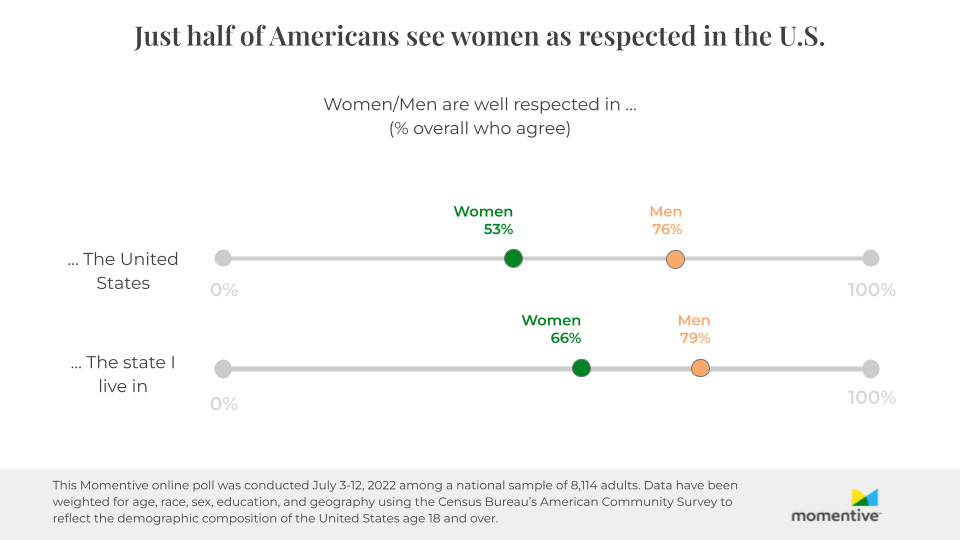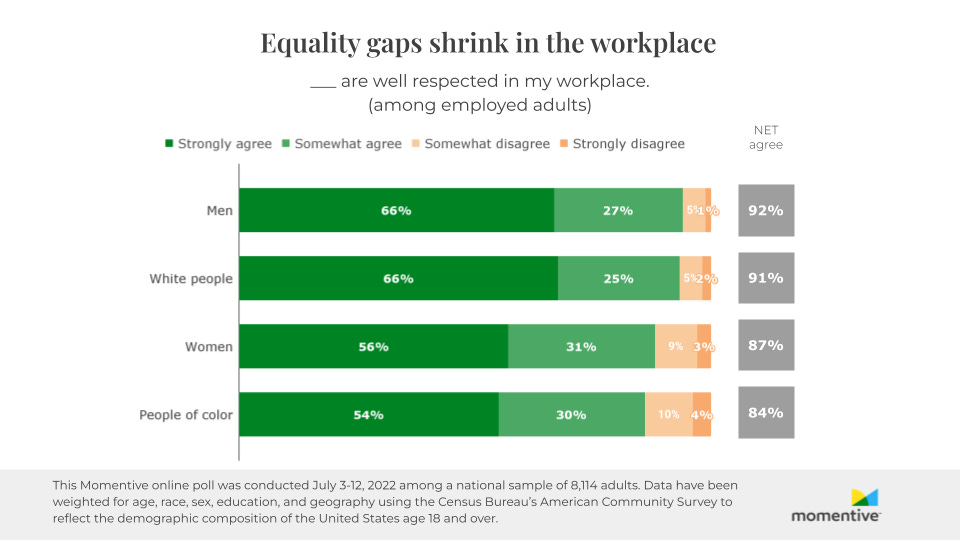New poll: equality by gender and race
Hello from SurveyMonkey!
This week we’re sharing new data on equality in the U.S., both in terms of gender and race.
But first: What does the future hold for NFTs? Find out with our new quarterly NFT tracker! Each quarter we’ll release new data that measures consumer sentiment around the emerging blockchain technology. Our latest data show a growing skepticism: nearly one in three (30%) believe NFTs are a scam, up from 24% the previous quarter, and more than twice the proportion of those who believe the blockchain technology to be the real deal (12%). Read the blog post or check out the Tableau dashboard to uncover more insights.
Just half of Americans say women are respected in the U.S.
Three-quarters of Americans (76%) say men are well-respected in the U.S., but barely more than half (53%) say the same for women, according to our new poll from July 3-12, 2022. Despite a continued fight for women’s rights and a push for gender equality, women still see the U.S. as more of a “man’s world”:
Just 42% of women say that women are well respected in the U.S. – far less than the number of men who say the same (65%)
Women are more likely than men to say that men are well respected in the U.S. (81% vs. 72%)
A 2018 Gallup poll showed similar results: a record-low 59% of Americans said women in the country are treated with respect and dignity, down sharply from 68% the previous year and dropping notably among women (just 48% felt women in the U.S. are treated with respect).
In addition to gender, there’s a heavy partisan split: 75% of Republicans agree that women are well respected in the U.S. – nearly double the 37% of Democrats who say the same – yet Democrats are far more likely than Republicans to say men are well respected in the U.S. (87% vs. 69%).
Yet, 66% of adults agree that women are well respected in the state they live in, a 13-point jump from those who say women are well respected in the U.S. (53%). All Americans, regardless of gender, age or race, are more likely to agree that women are well respected in the state they live in compared with the U.S. as a whole.
The impact of the Dobb’s decision is clear: just 59% of those in states where abortion is prohibited and 62% of those in states where abortion is either restricted or the legal status is unclear agree that women are well respected in their state – well below the number of adults living in states where access to abortion is legal and/or expanded (75%)
Among men, no such national/state disparity emerges: 79% of adults agree that men are well respected in the state they live in, roughly unchanged from the number who agree that men are well respected in the U.S. (76%).
Americans see people of color as least respected in the U.S.
The 23 percentage point gap in respect by gender widens even further by race: just 45% of Americans say people of color are well respected in the U.S., compared with 77% who say whites are well respected.
Politics continues to play a role: Republicans are the only group to feel people of color are more well respected in the U.S. (74%) than white people (63%)
This issue hits home for Black Americans in particular: just 30% agree that people of color are well respected in the U.S. – the lowest across all racial groups by far (45% of Hispanics, 46% of Asians, 49% of whites and 47% of adults of another race say the same). In comparison, 89% of Blacks said white people are well respected in the U.S., among the highest compared with their peers (88% of Asians, 79% of Hispanics, 73% of whites and 61% of adults of another race say the same).
As seen with women, Americans (55%) are more likely to agree that people of color are well respected in the state they live in compared with the U.S as a whole (45%).
This jump is particularly low among Black Americans: just 36% say people of color are well respected in their state, only 6 points above the number of Blacks who say people of color are well respected in the US (30%)
Just 50% of those in the Midwest say people of color are well respected in their state – the lowest compared with the Northeast (60%), the West (60%) and the South (54%)
A similar (albeit smaller) shift occurs for white people too: 82% say white people are well respected in their state, just slightly above the number who say white people are well respected in the U.S. (77%).
Workers find equity in their workplace as Americans struggle to see it in the U.S.
While many Americans struggle to see gender or racial parity in the U.S., employed adults see their workplaces differently: 87% of employed adults agree that women are well respected in their workplace, roughly on par with the number who say men are well respected in their workplace (92%), perhaps signaling that equity gaps between groups are considerably smaller in the workplace than in the U.S. as a whole.
Men are more likely than women to say women are well respected in their workplace (91% vs. 82%)
Similarly, 84% of workers say people of color are well respected in their workplace, just a few points below the number of workers who agree that white people are well respected in their workplace (91%).
Black workers feel otherwise: just 68% of Blacks agree that people of color are well respected in their workplace while 88% of whites, 87% of Asians, 83% of Hispanics, and 75% of adults of another race say the same
That’s all for this week! Thanks as always for reading.




